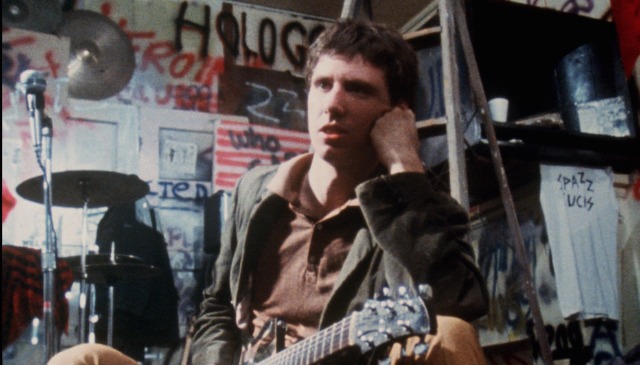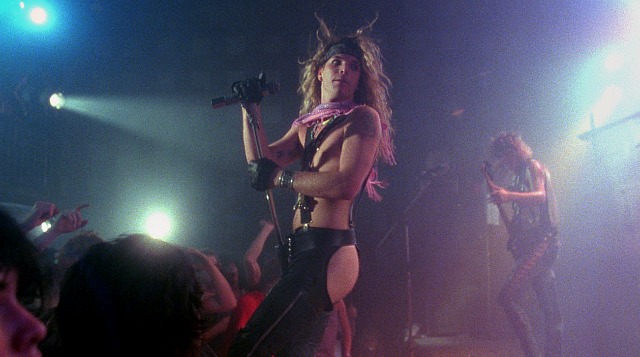Penelope Spheeris Looks Back At 'Decline' Docs And Giving Hollywood The Kiss-Off
By Joel Wicklund in Arts & Entertainment on Jun 23, 2015 6:20PM

Penelope Spheeris, photo by Suzanne Allison courtesy Shout! Factory
The Decline of Western Civilization documentaries—three linked yet very different films covering punk rock, heavy metal and their subcultures—are probably the best-known examples of that side of her filmography. The movies are getting a deluxe reissue with Shout Factory's release of a box set with all three films on DVD and Blu-ray, with multiple supplemental features.
The veteran director will appear at the Music Box Theatre Saturday, June 27 for Q&As surrounding showings of The Decline of Western Civilization (1981) and The Decline of Western Civilization, Part II: The Metal Years (1988). She spoke with Chicagoist about all the films, which she noted are not truly music documentaries.
"The music is an excuse to study the social environment," Spheeris said.
That's especially true of The Decline of Western Civilization, Part III (1998). With minimal theatrical distribution and unavailable on home video until now, this is the least known of the series and the most sobering. Focusing on "gutterpunk" homeless kids, it digs into the most desperate corner of punk culture.
"You can see why it didn't get any distribution, because people think 'kids and music and fun' ... well, it ain't that much fun," the director explained of the impactful film, which ranks with Martin Bell's Streetwise (1984) as a vital look at homeless youth. In Decline Part III, the self-destructive habits of teens and twenty-somethings on the fringes of society are revealed as the result of troubled upbringings and much abuse. While she is quick to acknowledge it wasn't nearly as dire as what's shown in the movie, Spheeris' own difficult childhood triggered her deep empathy for her subjects.

Greg Ginn of Black Flag in "The Decline of Western Civilization" (photo courtesy of Shout! Factory).
"It was four kids, a mom, and I had seven different stepfathers over the years and it was an alcoholic, very violent household. And so I think by doing Decline Part III I kind of psychologically worked through a lot of my own damaged self. And I saw that, yeah, I did have a hard time, but guess what? People have a much harder time than I had. I had to watch my mother get all bloody...quite a few times. But people have to go through even worse things than I did."
While the original Decline put the spotlight on the bands (including influential acts like Black Flag and X), it fits in the same social landscape as the third film—showing disaffected youth embracing outsider status. By contrast, The Metal Years is almost the comic relief of the series. It's a slick, entertaining and largely lighthearted view of the '80s heavy metal scene, with much emphasis on the "hair bands" that embraced the glamour and pursuit of wealth and fame the hardcore punk rockers rejected. But the director sees a larger continuum.
"If you look at the '50s, let's say, up until now, you'll see trends that American youth have experimented with that just flipped on a dime. You went from the conservatism of the '50s to the liberalism of the '60s...it's almost like each generation kind of reacts opposite to the other."

The band Odin models ass-less metal pants in "The Decline of Western Civilization, Part II: The Metal Years" (photo courtesy of Shout! Factory).
Spheeris senses a change in that pattern, however. "Now that digital technology has kicked in, all bets are off because it's so scrambled up that nobody can react to anything and everybody's just fucking confused," she says with a laugh.
Decline II's cult following opened up new opportunities for Spheeris in Hollywood. Wayne's World (1992), a spinoff feature of the Saturday Night Live sketch, was such a big hit, it seems like she should have had her pick of projects. But Spheeris says she only received offers for other broad, mainstream comedies.
She directed several and made a good living while that run lasted, but the work (including feature versions of The Beverly Hillbillies and The Little Rascals, as well as the Chris Farley/David Spade comedy Black Sheep) was unsatisfying. And without another box office showing to match Wayne's World, her Hollywood stock dropped quickly.
Then again, Spheeris may have been ready for that fall. She seems resigned to Senseless, a 1998 comedy with Spade and Marlon Wayans, being her last made-for-the-multiplex effort.
"I kind of checked out of the mainstream studio system before they fired me, you know, for Senseless, which didn't do any business thanks to [executive producer and Miramax/Dimension honcho] Bob Weinstein, who fucked up the ending of it."
Still, initially Spheeris' withdrawal from the studio world may have led her to devalue the legacy of her work. Her daughter Anna Fox, who co-produced the new box set, had to convince her that her opinion was wrong.
"She said, 'Mom you have no idea how much people want to see these films, and...the other thing...you have no idea who you are.' And I said, 'What the hell does that mean?' And she said, 'People really respect the work and respect you and they want to hear from you.' And I'm like, 'Really?' I was just ready to just go die, you know?"
Fox, who joined in the conversation, said that statement isn't entirely a joke.
"She's being serious. I mean, not immediately [dying], but about not having to deal with any of this [her past work] between now and then."
Fox convinced her mother the Decline films were worth revisiting and working with her daughter on the box set got her more enthused about other projects. The Decline of Western Civilization, Part IV is in the works (though she won't divulge the subject of this chapter) and she is also producing a documentary Fox is directing about their family history, including a traveling carnival owned by Spheeris' father.
She won't rule out working on an outside script, or even a studio film, but expects any new work to be of the do-it-yourself variety. Spheeris says she is past the point of chasing projects that end up as dead ends.
"How many times do you have to beat your head against a brick wall to realize that if you stop, you feel better?" she asked with a laugh.
"If something wonderful comes along and it's viable, I would consider it. But I'm really so happy that I got over that hump of feeling bad that I couldn't make any more [commercial] movies. I don't feel bad about it. I'm kind of fine with it. It's cool. It's actually a big fucking relief. I don't need Hollywood. Hollywood doesn't need me. Fine. Goodbye."
Penelope Spheeris hosts screenings of The Decline of Western Civilization (9:45 PM) and The Decline of Western Civilization, Part II: The Metal Years (midnight) this Saturday, June 27 at the Music Box Theatre.